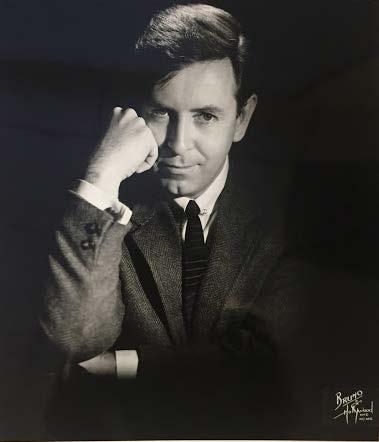
4 minute read
Bill Pursell
William W. Pursell
June 9, 1926 – Sept. 3, 2020
Distinguished composer, arranger, and keyboardist William W. "Bill" Pursell, 94, died Sept. 3, 2020. He moved to Nashville in 1960 on the invitation of Eddy Arnold, and became part of an elite group of musicians, producers, and arrangers present at the inception of what would become the “third coast” of the music business. He brought his gifted musicianship, gracious intellect, and inimitable style into the mix, and his contributions cannot be understated. He was a life member of the AFM who joined Local 257 June 17, 1960.
Born June 9, 1926, in Oakland, California, Pursell was raised in Tulare. He studied composition at the Peabody Institute of Music in Baltimore, Maryland, and arranged for the U.S. Air Force Band while serving in the military during World War II. After his service he studied classical composition at the Eastman School of Music and earned a masters in composition in the mid1950s. His initial musical award came quickly, when “Christ Looking Over Jerusalem,” the first movement of “Three Biblical Scenes for Orchestra,” was the recipient of the Edward B. Benjamin Prize in 1953.
Pursell toured with a jazz trio and also played R&B on the road before his move to Nashville. Two years later he had signed as a solo artist with Columbia Records, and released the title track single “Our Winter Love,” which reached the Billboard Top 10 in 1963. The album and follow up single — “Loved” — also charted, but Pursell soon transitioned into session and live performance work — which included what he termed a career highlight of playing with Chet Atkins for President John F. Kennedy in the White House. He played on a plethora of recording sessions for Owen Bradley and others in the vibrant formative days of the Nashville Sound, and his session work reads like a who’s who of the era. The list includes Patsy Cline, Johnny Cash, Boots Randolph, Joan Baez, J.J. Cale, Willie Nelson, Marty Robbins, Dan Fogelberg, Bob Dylan and many others. In addition to his frequent live appearances and studio sessions, Pursell also worked with the Nashville Symphony, and taught at Tennessee State and Vanderbilt University.
In the ‘70s he was nominated for two Grammy awards. The first was his performance on the album "Listen" for the singer Ken Medema in 1974. The second was for his 1978 arrangement of “We Three Kings” for a National Geographic album.

Pursell’s symphony, Heritage, which was commissioned by the Nashville Symphony and Victor Johnson, debuted in 1989.

Bill Pursell and his daughter Laura
Along with all his other notable skills and talents, Pursell was passionate about music education. He became a member of the faculty of the School of Music at Belmont University in Nashville in 1980, where he taught until his retirement in 2017. His lifelong devotion to teaching and his long friendship with fellow musician W. O. “Smitty” Smith resulted in him being invited in the 1960s to join an integrated men’s discussion group. The members dealt with issues of racial inequality and the need for music lessons for underprivileged children. These talks helped lead to the founding of the W.O. Smith Music School in 1984, which has helped many children discover the joy and the power of music. Pursell was named the Composer of the Year in 1985 by the Tennessee Music Teachers Association, and in 1991 he completed his Doctor of Musical Arts degree at Eastman School of Music.
Pursell continued to record albums after his first Columbia release in 1962, "Our Winter Love." His records include "The Nashville Sweat Band and Aides" (2013), "Millenium" (2016) and "My World’s a Blur World," (2017). As late as August he was working on a new release to be titled "Lilacs," with his daughter, singer Laura Pursell, when he fell ill.
Friend, fellow pianist, and Director of Education and co-founder of the Nashville Jazz Workshop Lori Mechem talked about the significance of Pursell’s work.
“Bill Pursell was one of Nashville’s greatest stars! Not only was he an amazing composer and arranger, but Bill could play ANYTHING on the piano. From classical, country, pop to jazz — he could do it all. I always loved hearing him play classical because he was so passionate about it. Bill was a great man and always had something new to share — even at 94! I am grateful for our 30-plus years of friendship. We have lost a vital part of our Music City history and we ALL will miss him greatly,” Mechem said.
Pursell was preceded in death by his wife, Julie Crow Pursell; and one daughter, Sharon. Survivors include three daughters, Laura Pursell, Ellen Spicer, and Margaret Pursell; two sons, Bill and Arthur Pursell; and four grandchildren.
A funeral mass was held Sept. 17 at The Cathedral of the Incarnation in Nashville, with interment following at Calvary Cemetery. Those interested may make a donation to the Belmont University School of Music William Whitney Pursell Scholarship in Composition. For information call (615) 460-6408.










